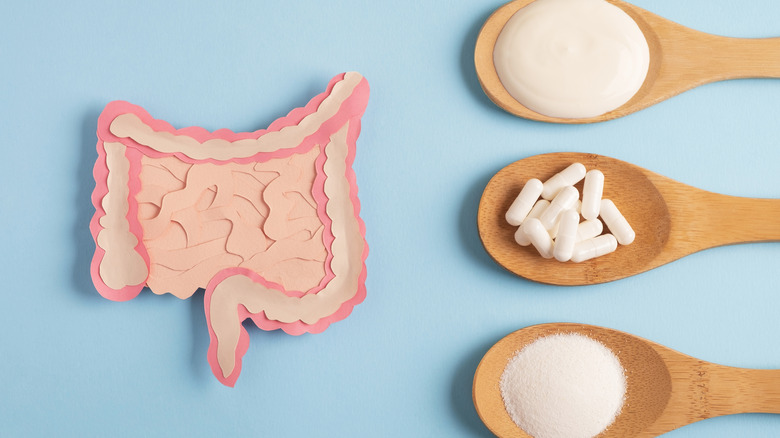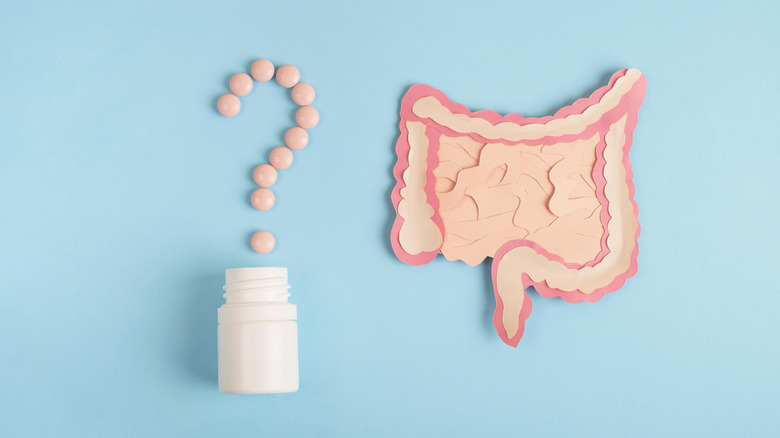Co-Founder Of Seed Health Raja Dhir Talks About The Benefits Of Probiotics - Exclusive
What exactly are probiotics, and should everyone be taking them? According to a National Health Interview Survey, probiotics are one of the third most common dietary supplements, after vitamins and minerals. Probiotics are living microorganisms that can help support the health of your gut microbiome. These microorganisms are naturally occurring in the body, and can help with bodily functions like digestion, immune system support, and vitamin production. They can be found in foods like yogurt and sauerkraut, as well as in supplements.
There are many scientific studies proving the effectiveness of probiotics –- they have shown to be helpful for a variety of health issues, like preventing diarrhea from antibiotics, soothing infant colic, periodontal disease, and ulcerative colitis (via National Center for Complementary and Integrative Health). However, more research needs to be done to understand exactly which probiotics are helpful and which are not.
"While research into the gut-brain axis shows a lot of promise, it's also important to acknowledge that this is a relatively new field of study," says Raja Dhir, co-founder of Seed Health, a microbiome company. The gut-brain axis, also known as the gut-brain connection, is the "rich and complex network of physiological pathways that link our gut to our brain." In an exclusive interview with Health Digest, gut microbiome expert Raja Dhir explains the gut-brain connection and the role probiotics play in the digestive system.
Probiotics and the gut-brain connection
Your gut and brain are connected. Research suggests that "the gut-brain axis is a bidirectional line of communication, meaning that gut health impacts brain health, and vice versa," says Dhir. "Insights into this gut-brain crosstalk have revealed a dynamic communication system that not only influences intestinal activities like digestion and motility, but also regulates immune and pain response, metabolism, mood, social behavior, and cognition." This means that a healthy gut can help support mental health, and inversely, a balanced brain promotes a healthy digestive system. Probiotics may be a part of that equation for some people.
"It's important to remember that probiotics are a science, and specific strains are studied for specific outcomes," says Dhir. When you take a walk down the probiotic isle in your local health food store, you will see on the labels that some are targeted for digestive health, while others are made specifically for immune support, vaginal health, urinary tract support, and more –- or a combination of these. While the scientific research is promising, there are still no conclusive results around probiotics and mood disorders. "Currently, there are no known probiotic innovations on the market that have been proven to directly ease symptoms of mood disorders," states Dhir.
Are probiotics for you?
That being said, there are many factors that can throw off your gut microbiome: an unhealthy diet, deficiency in fiber, overconsumption of antibiotics, and environmental influences can all play a part. Probiotics can help bring your gut microbiome back into balance. According to Dhir, a healthy balanced diet and "probiotics can be an impactful way to nurture and support the microbiome and systemic health beyond digestion." However, not everyone should take probiotics.
Every individual is unique, with distinctive needs and gut microbiomes, so it is important to consult with your doctor before starting any specific supplement program. For example, those who are immunocompromised should avoid probiotics, according to the Probiotics Learning Lab. Some more serious digestive health conditions, like small intestine bacterial overgrowth (SIBO), could be triggered by probiotics and worsen symptoms (via The Upside). Ultimately, it is up to you and your doctor to make an informed decision on the best course of action for your gut health.
Seed Health is working toward advancements in gut-brain research, which present the potential to impact well-being in areas like anxiety, depression, and stress response, reimagining ways to approach mental health.



